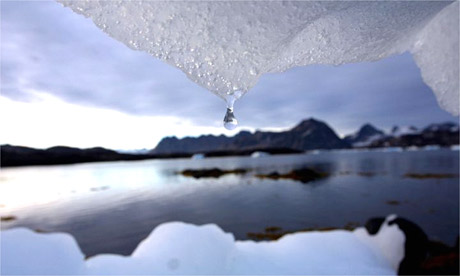50 people who could save the planet
Stranded polar bears, melting glaciers, dried-out rivers and flooding on a horrific scale - these were the iconic images of 2007. So who is most able to stop this destruction to our world? A Guardian panel, taking nominations from key environmental figures, met to compile a list of our ultimate green heroes.

Photograph: AP
Last year ended with the incongruous image of 10,000 politicians, businessmen, activists and scientists from 190 countries emitting vast quantities of greenhouse gases as they flew home from Bali clutching the bare bones of a global agreement on climate change. The agreement was to keep on talking to try to reach a deal by 2010. It was a diplomatic triumph, achieved after rows and high dramas, but it leaves all nations a mighty hill to climb. There is no agreement on what emission cuts need to be made by when or by whom, and the US is still deeply reluctant to do anything. It is a roadmap with no signposts.
Some were optimistic that a start had been made; some said that the earth's ecological situation was in a far more perilous state than had been thought. The iconic images of 2007 - polar bears stranded, glaciers melting in the Himalayas, forests coming down all over Africa and devastating floods and droughts from Bangladesh to Ghana - may be as nothing to what will happen if people do not take immediate action.
But who are the people who can bring about change, the pioneers coming up with radical solutions? We can modify our lifestyles, but that will never be enough. Who are the politicians most able to force society and industry to do things differently? Where are the green shoots that will get us out of the global ecological mess?
To come up with a list of the 50 people most able to prevent the continuing destruction of the planet, we consulted key people in the global environment debate. Our panel included scientists - former World Bank chief scientist and now the British government's scientific adviser on climate change, Bob Watson, Indian physicist and ecologist Vandana Shiva, Kenyan biologist and Nobel prize-winner Wangari Maathai; activists - Guardian columnist George Monbiot and head of Greenpeace International Gerd Leipold; politicians - Green party co-leader and MEP Caroline Lucas, and London mayor Ken Livingstone; sustainable development commissioner for the UK government Jonathon Porritt and novelist Philip Pullman.
Then the Guardian's science, environment and economics correspondents met to add their own nominations and establish a final 50. Great names were argued over, and unknown ones surfaced. Should Al Gore be on the list? He may have put climate change on the rich countries' agenda, but some felt his solution of trading emissions is not enough and no more than what all major businesses and western governments are now saying. But in the end he squeaked through.
There was also debate over Leonardo DiCaprio. It would be easy to sniff at someone who seemed to have merely pledged to forgo private jets and made a couple of films about the environment, but we felt the Hollywood superstar who has grabbed the green agenda had to be included because of the worldwide influence he is expected to have. Thanks to his massive celebrity status DiCaprio could be a crucial figure in persuading and leading the next generation.
Some people made it to the final 50 not just because of their work but because - like the man who has found a simple way to save energy in a refrigerator, or the boy who collects impressive amounts of money for the protection of tigers - they represented a significant grassroots technological or social movement. And some got on the list because they were considered the driving forces behind the decision-makers. One church leader, for example, made it largely because the world's religions have huge investments and are shifting the political landscape in the US and Europe.
The final list includes an Indian peasant farmer, the world's leading geneticist, German and Chinese politicians, a novelist, a film director, a civil engineer, a seed collector and a scientist who has persuaded an African president to make a tenth of his country a national park. There are 19 nationalities represented. Nearly one in five of those listed comes from the US, and one in three is from a developing country, suggesting that grassroots resourcefulness will be as important as money and technology in the future. Nearly one in three of the people chosen has a scientific background, even if not all practice what they studied. It's not a definitive list and there are no rankings, but these 50 names give a sense of the vast well of people who represent the stirrings of a remarkable scientific and social revolution, and give us hope as we enter 2008.
John Vidal

0 Comentarios:
Publicar un comentario
Suscribirse a Comentarios de la entrada [Atom]
<< Página Principal